- Home
- M G Vassanji
Mordecai Richler Page 11
Mordecai Richler Read online
Page 11
In that lecture, Richler in particular targeted the recently introduced government grants to Canadian publishers, though he favoured grants to writers. He himself had received Canada Council grants when in dire need in England. His argument against grants to Canadian publishers was that they discriminated against Canadian writers who published with the multinationals. One could counter that multinational publishers, with their deep pockets, could do enough for a Canadian writer with or without a grant. And if quality of writing was the question, it was the grants to authors that risked supporting the second-rate while always increasing the Councils’ constituencies. Many years after the Plaunt Lecture, McClelland & Stewart, a Canadian company of iconic status and long Richler’s publishers before he moved to Knopf, became partly owned by Random House, itself part of a global conglomerate that also owned his new company.
Richler’s friend the publisher Jack McClelland, who disagreed with him about the issue of publishers’ grants, recommended him in 1974 as the Canadian reader for the Book of the Month Club (BOMC). Richler was a diligent reader, and the critiques and recommendations he produced were often incisive. But he had to read dozens of Canadian books year in, year out, and though this job gave him enjoyable trips to New York, perhaps it was another sideline that took him away from his more serious writing.
OVER THE PERIOD of thirty years from his return up to his death, Mordecai Richler would publish only three full-length novels, though he also published the popular Jacob Two-Two children’s books and several works of non-fiction. In his fiction he would go back to the Montreal milieu of his childhood and youth; this tendency to return to a past long left behind was something for which he had, in fact, faulted his London friends from the colonies. It was a symptom of a malaise, which to cure he had physically returned home to Canada. In his successive novels Richler, however, would rework that imaginative world of his childhood to explore the situations of his protagonists as they grew older and went on their different ways. He became, in effect, the grand storyteller and mythmaker of St. Urbain Street, which had long since become transformed by new waves of immigrants, its former residents having moved on to wealthier Outremont or Westmount or farther on to Toronto during a climate of increasing instability and acrimony in the province.
His return did, however, give him material for his essays and columns—in effect, another literary career. Some of these pieces were personal; others were opinions and often satirical; a few took the form of travel writing, and some others were bagatelles, from a writer surviving on his craft and finally beginning to live off his reputation. Many of these pieces were brought out in collections. A proud professional, he had always used such occasional writing to supplement his income and even his lifestyle. He was an engaging, combative, humorous writer in this vein, and ironically it was through these shorter commentaries that many Canadians would come to know and adore him.
There grew, inevitably for a celebrated man of letters, an established quality to Mordecai Richler: he did the literary circuits, juried prizes, and critiqued for the BOMC; he wrote opinions that were often incisive and provocative. Gone were the urgency and the desperation, the excitement and fever of a young man on the brink of his career, sending off earnest letters to friends, family, and publishers, announcing his plans, celebrating the small and the large, asking for money. Inevitably, too, there appeared, in his columns, an element of playing to the gallery; he often said the unsayable, regarding Canadian culture, political correctness, and even occasionally the United Jewish Appeal, and this excited his friends and admirers, though one cannot help thinking that he sometimes took the short logical cut, going the straight line, unwilling to glance at the valleys, pay attention to nuances. It is the satirist’s job to point out the ludicrous in certain positions, and Richler jumped at the chance whenever some enthusiast for a cause tripped over themselves without realizing it. He would thus become a proxy for the Canadian right, who came to embrace him, and for all those whose gut responses he seemed to be articulating so well.
The trajectory from working class and left wing in youth to the right in older age is a well-travelled one. But it would be incorrect to map Richler’s career squarely upon it. What he consistently stood against, and ridiculed, was the special pleading, the hypocrisy, and the sheer opportunism that often lie behind trendy causes. But he was not one to explain himself, or build bridges, and one wonders if the perception of him as increasingly belonging to the right led to his distancing from his old leftist friends from London, George Lamming and Doris Lessing. According to a witness, at a Toronto festival in the 1990s, Lamming walked by Richler without even a nod; and Lessing mentions Richler only in a passing sentence in her autobiography.
Throughout his career, Richler had used material from his life in his novels; he also often wrote about himself, so that he produced a large quantity of autobiographical material, though not exhaustive and sometimes repetitive. He had no qualms about recycling material. In the personal writings we do find a story of his life, albeit patchy. Thus, he wrote affectionately about his father, but relatively little about his mother—though she appears fictionalized in several novels, an intriguing figure that one must discover for oneself. He never wrote about his first wife, Cathy; and about Helen, his girlfriend in Europe, he attempted a fictionalized account in the unpublished and aborted manuscript “Return to Ibiza.”
IN LONDON, writing film scripts had rescued him from a life of near penury, with a new and growing family. He had a knack for it, yet he could not let it come in the way of his serious creative work. He turned down some tempting prospects. Back in Canada he was not as dependent on scriptwriting, and there were not many commissions forthcoming anyway. But in May 1972, a few months before he returned to Canada, in Cannes he had happened to meet three other Canadians, his old friend Ted Kotcheff, producer John Kemenyi, and Michael Spencer of the CFDC—the Canadian Film Development Corporation—and the idea for a film treatment for Duddy Kravitz was broached once more. It had come up a long time ago, in the 1950s, when the book was published. Ted Kotcheff had said he wanted to do it but over the years could find no one interested in financing a film about a Canadian Jew growing up in Montreal. Chicago, yes, New York, yes. But Montreal? Now, with the Canadian-government-funded CFDC willing to throw in support, a movie might just be possible. Richler’s old nemesis, the CBC, demurred in giving any money to the project, but a former schoolmate called Schneider from Baron Byng came to its timely rescue. There were some difficulties, including a bad initial script, which Richler rewrote, and a financial shortfall—the budget had been set at $600,000 and ended up a little less than a million—before the movie was released, in April 1974, with well-known international stars and an upcoming Richard Dreyfuss in the lead role of Duddy Kravitz. Shooting was done on location in Montreal and at the Eastern Townships in the fall; reading Richler’s account of the proceedings makes it too evident that he was in his element, he was home.
The film was launched in Montreal, as was appropriate and at Richler’s insistence, at a black-tie charity event, $100 a couple. It went on to become the most commercially successful Canadian film to date, won the Writers Guild of America Award for Best Comedy Adapted from Another Medium, and the Golden Bear at the Berlin International Festival, and was nominated for the 1974 Academy Award in the category of Best Screenplay Adapted from Other Material. For Richler, the trip to Hollywood for the award ceremonies was, however, a journey to another planet. He went with Florence and seemed to have enjoyed it, the honour as well as the slights, for there was a pecking order in place dependent strictly on one’s worth. At the airport they had not been met by limo or taxi; they stayed not at the posh Beverley Hills Hilton but their agent’s flat; and so on. He managed to keep bemusedly detached from it all, however, and felt—one supposes—utter contempt at the vacuity and moral worthlessness of Hollywood. Ample supplies of liquor seem to have helped, and according to one witness he managed, on the Awards night, to utter an expletive at the a
ctress Lauren Bacall a couple of seats away. He didn’t have to go, of course. But why miss the experience? And he got an article from it, after all.
Flush with financial success, he was now able to afford a cottage for his family in the Townships, at beautiful Lake Memphremagog, which he liked to call his dacha. But it was no mere everyman’s cottage, with its two floors and seven bedrooms, not to mention a sunroom. Soon he had a motorboat and he could be seen on the lake on a bright summer morn or warm evening taking it out for a spin. At cottage parties in this exclusive resort he might meet one or more of the high and mighties of the province, politicians, newspaper baron and future lord Conrad Black. This was a kind of life and prestige he could never have attained in England.
IN THE MID-1990s, twenty years after his return to Canada, he wrote about London—where he had begun to spend his winters with his “restless” wife—in an article titled “London Then and Now.” A confirmed Canadian institution now, Mordecai Richler liked little about the city. He did not care about its cultural scene, sports, infatuation with royalty, the incestuous literati. “Alas, we had been in London for only a month when I realized that we had settled among vulgarians and that I would now have to endure cultural overload that could oblige me, any night of the week, to get into a suit and tie and charge out into the rain to attend one or another of the oppressive cornucopia of plays, concerts, or vernissages available.… A quick perusal of Time Out reveals the week’s depressing choice of political demonstrations, lectures, gallery openings, museum special events, concerts, and plays.” It is a middle-aged Richler writing, a man of the people, when he doesn’t have to pretend to enjoy concerts, or feel obliged to support left-wing causes, or go to yet another avant-garde interpretation of Shakespeare or a performance of Benjamin Britten. Florence apparently did still patronize and enjoy those cultural events. He defends hockey, scorns soccer fans (when they were at their worst in England). He almost brags about his Canadianness. We know that he had begun to appreciate it more and more. In its simplicity was its sanity. But this diatribe against London is not one of his wiser moments, but of playing a role, writing too quickly for a deadline. One wonders what he would think about cricket reports in The Globe and Mail now and soccer attendance in Toronto matching hockey’s. But he was not one to deny the passage of time; he would only be honest to his own.
CHAPTER EIGHT
The Haunted Jew
As a young man Mordecai Richler once said that he believed one should mourn those who died in the concentration camps because they were human, not because they were Jews. This was said in a letter, and was definitely not a considered opinion; it was, perhaps, only a working hypothesis by a young man. It is raised here only to remind us how engaged he was with the question of his Jewish identity. We should mourn people’s tragedies not because of who they are—that sounds reasonable enough, though it’s idealistic, going against the grain of common human behaviour, an attempt at a humanist point of view. One should grieve for all human suffering; but we grieve for family and tribe first. We can hardly be surprised at Jews mourning for Jews, following a history of anti-Semitism and exclusion. It was as Jews that the victims were selected.
What kind of a Jew was Mordecai Richler? In his fiction he invoked the community, always, but not its God. He did not seem to have believed in God as an adult, but he did not take Him on or blaspheme. In an unusual instance, however, in an article titled “Deuteronomy,” he talks irreverently and even fondly of the God of the Bible, the author of so many of the inhibitions he grew up with. To illustrate the meaning of God to him, he tells a story about Evelyn Waugh and Randolph Churchill in a British plane about to be parachuted into Yugoslavia. Churchill, answering Waugh’s challenge, picked up and started reading the Old Testament; halfway through, he slammed the book down, saying, “I never realized that God was such a shit!”
Says Richler, “I have repeated this anecdote often, though never in an airplane, because, such was my upbringing, the truth is it still scares me to tell it at thirty-five thousand feet.”
Richler tells another revealing tale in the article. It is about his friend Ornstein from school.
Ornstein, who broke with the Communist Party long ago, is still opposed to all kinds of religious mumbo-jumbo, any sort of tribalism. A scientist of some renown, he always seems to be heading for or just coming back from an important international conference in Tokyo, London or Milan. Last year he was in Jerusalem for the first time, and he went to see the Wailing Wall. “And you know what?” he said. “I burst into tears. I wept and I wept.”
As a child Mordecai Richler attended the Talmud Torah Jewish parochial school, where Hebrew was taught in the morning and English and French in the afternoon. Moreover, coming from an observant Hasidic family, he went two afternoons a week to the Young Israel Synagogue for Talmud lessons. And even though the boys would make fun of the teachers and play pranks, many of those lessons were indelibly impressed on his mind, for he always relished quoting in his novels stories from the Bible and the arguments of the old rabbis; Moses Maimonides, “the Rambam,” and Rabbi Akiva were his favourites. Back as a boy he could not switch on lights, listen to the radio, or answer the phone on Sabbath. This must have been deeply embarrassing, for not all his mates at the Talmud Torah came from such strictly observant families and he would get teased. On Saturday nights the family would gather at his grandfather’s house for the ceremony of the ending of the Sabbath, when a candle would be lit and placed in the hands of the youngest child.
As a teenager, soon after his bar mitzvah, Mordecai started rebelling; he boasted about being an atheist, violated the Sabbath, and walked about bareheaded. His tyrannical grandfather, Shmarya, kept tabs on him and on several occasions beat him for non-observance while his timid father watched and suffered lectures. How frequently this happened is not clear, but on the last of these punitive occasions, before a tribunal composed of the entire family, Shmarya called the boy a shabbus goy, violator of the Sabbath, and slapped him about the face before throwing him out. The two never spoke again. Mordecai had become an apikoros, he says, an unbeliever. When the old man died, in accordance with his will, Mordecai, fourteen years old, was not allowed to touch the coffin. “I turned to my father. Help me. Help me,” Richler wrote many years later. That he was so aggrieved by this denial to participate in a sacred ritual for the dead is revealing. A child wants to rebel, not to be thrown out.
Jewishness was all around him, in language, in customs, in history and memory. It saturated the air in that small grid of streets west of the Main called the ghetto. Like the proverbial burden of the Jews, Mordecai carried it with him, though not to lament it but to interrogate it. As a young man he had been tormented by his Jewish heritage and the question of assimilation; he had yearned to be simply himself. He went away not only from what he would call a provincial, “picayune” Canada, but also from a stifling community life confined to within less than a square mile, and its demands based on ancient traditions. His confrontations with his Jewishness would become the stuff of his fiction; its brilliance, close observation, and authenticity of atmosphere, character, and language would reflect his intimacy and even his affection for the community he grew up in. Indeed, in some sense, he never left it.
In another sense, though, he did break out. He married a non-Jewish woman against his family’s strongest objections. By this time he had formulated his position as a Jew confidently enough to reply to his wounded father, sternly and unapologetically, telling him in effect that his father’s (Shmarya’s) God was from the Stone Age. His second wife, Florence, was also non-Jewish (though she had formally converted), and he did not raise his own children strictly as Jews. They were not bar-mitzvahed, did not visit synagogues. The home was not kosher. His daughters went to convent schools, for their quality of education, and his sons went to private English schools. But he enjoyed presiding over the Passover meal and going over the Biblical stories with the children. He also enjoyed playing Father Christmas, a
nd leaving out stockings and presents for the children, concessions perhaps to a harmless winter holiday phenomenon and occasions for a pang or two of conscience. When his father died, he returned to Montreal for the funeral, but at the ceremony refused to have his tie and jacket cut, as tradition demanded. And finally, when he himself died, he was buried in a non-denominational cemetery in Montreal.
But it was for being a Jew that he could be denied access to certain public places in his native Canada in the 1940s and 1950s. He was well aware of why his grandfathers had to leave Eastern Europe. Six million people who bore the same brand as he did perished for no other reason than that identity. You cannot become an un-Jew by rebelling against it. Not only had he imbibed the tenets of Judaism from the synagogue, the Talmud Torah, and the home; but also, as he wrote to his father, he continued to study it. That a man with such a complex, searching relationship with his origins would be called a self-hating Jew is a case of the easy namecalling that is so much a part of our recent culture; in his case it is also touched by a cruel irony.
Richler strongly denounced the anti-Semitism he had witnessed: among the teachers at Baron Byng, in the admissions policies at McGill and Sir George Williams College, and in the Quebec of the war years. In one major, and quite uncharacteristic article, he systematically took on the anti-Semitism in the works of Ian Fleming, the author of the James Bond novels, which were so much a phenomenon of 1960s London.

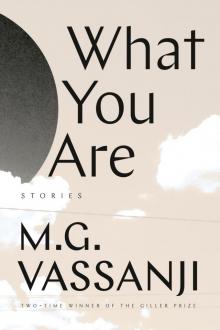 What You Are
What You Are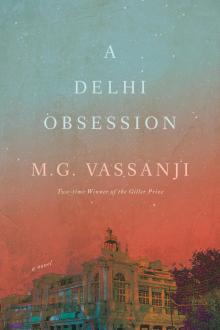 A Delhi Obsession
A Delhi Obsession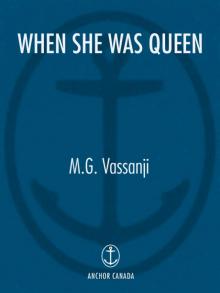 When She Was Queen
When She Was Queen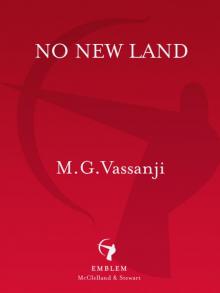 No New Land
No New Land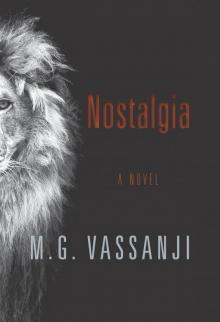 Nostalgia
Nostalgia Mordecai Richler
Mordecai Richler The Book of Secrets
The Book of Secrets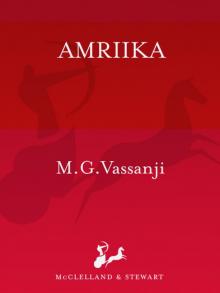 Amriika
Amriika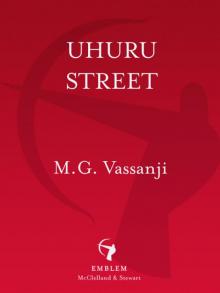 Uhuru Street
Uhuru Street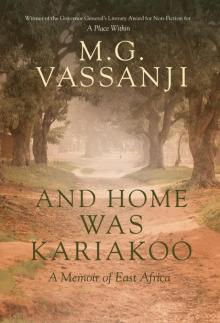 And Home Was Kariakoo
And Home Was Kariakoo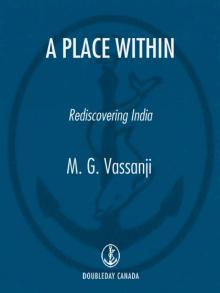 A Place Within
A Place Within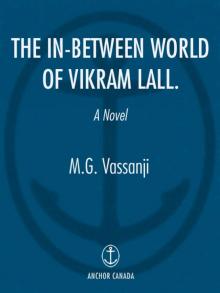 The In-Between World of Vikram Lall
The In-Between World of Vikram Lall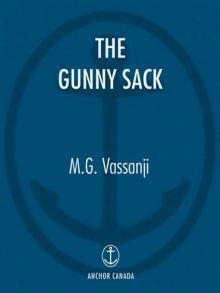 The Gunny Sack
The Gunny Sack